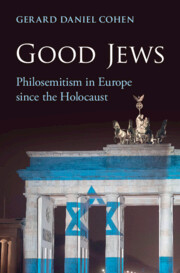
- Coming soon
- Publisher:
- Cambridge University Press
- Expected online publication date:
- June 2025
- Print publication year:
- 2025
- Online ISBN:
- 9781009370905

The Holocaust is now widely recognized as a central event in twentieth-century Europe. But how did the genocide of the Jews affect European attitudes towards Jews, Judaism and Jewishness after 1945? While many histories of antisemitism exist, Good Jews offers an investigation of philosemitism – defined as a politics of post-Holocaust friendship. Gerard Daniel Cohen presents a critical exploration of the languages of philosemitism in mainstream European politics and culture from 1945 to the present day, with particular emphasis on Germany and France. Within this framework Cohen explores how the 'Jewish question', or the problem of Jewish difference and incorporation in Western countries during the postwar decades, has been distinctively foregrounded in the language of philosemitism. Ultimately, Good Jews demonstrates that philosemitic Europe is not an idealised love story, but a reflection of European attitudes towards Jews from the Holocaust to the present.
‘G. Daniel Cohen shows that Europeans answered their ‘Jewish Question’ after the Holocaust in different versions of Philosemitism: an always revocable promise of national membership. With the majority of European populations opposing Israel’s military campaigns while their governments largely support them, rarely has there been a more timely book. A must read.’
A. Dirk Moses - author of The Problems of Genocide
‘Cohen’s landmark study offers a fresh examination of discourses of philosemitism and antisemitism across Europe in the decades from the Holocaust into the 21st Century. As Cohen traces the evolution of non-Jews’ ideas about Jews, he reveals the tangled relationships between philosemitism, philo-Zionism, anti-colonialism and Islamophobia.’
Alyssa Sepinwall - author of Slave Revolt on Screen
‘This first comprehensive analysis of European attitudes of toward Jews deftly explains why widespread prewar antisemitic sentiments transformed after the Holocaust into philosemitism, anti-antisemitism, and growing support for Israel. A crucial and timely contribution at a time of controversy over the uses and abuses of antisemitism and anti-Zionism.’
Omer Bartov - author of Genocide, the Holocaust and Israel-Palestine: First-Person History in Times of Crisis
 Loading metrics...
Loading metrics...
* Views captured on Cambridge Core between #date#. This data will be updated every 24 hours.
Usage data cannot currently be displayed.